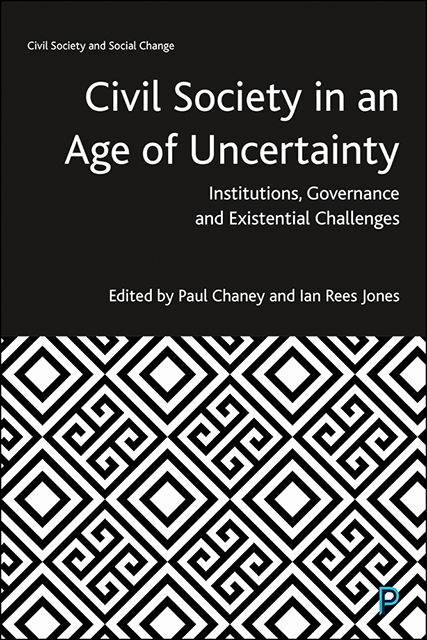Book contents
- Frontmatter
- Contents
- List of tables and figures
- Notes on contributors
- Acknowledgements
- 1 Introduction: Locating civil society
- 2 Existential challenges
- 3 Civil society and the governance of city region economic development
- 4 Civil society, pandemic and the crisis of welfare: exploring mixed economy models of welfare in domiciliary adult social care in a devolved UK
- 5 The contemporary threat to minority languages and cultures: civil society, young people and Celtic language use in Scotland and Wales
- 6 Digital threat or opportunity? Local civil society in an age of global inter-connectivity
- 7 Democratic decline? Civil society and trust in government
- 8 Xenophobia, hostility and austerity: European migrants and civil society in Wales
- 9 Meeting the challenge? Prospects and perils for civil society in the twenty-first century
- Index
5 - The contemporary threat to minority languages and cultures: civil society, young people and Celtic language use in Scotland and Wales
Published online by Cambridge University Press: 16 June 2023
- Frontmatter
- Contents
- List of tables and figures
- Notes on contributors
- Acknowledgements
- 1 Introduction: Locating civil society
- 2 Existential challenges
- 3 Civil society and the governance of city region economic development
- 4 Civil society, pandemic and the crisis of welfare: exploring mixed economy models of welfare in domiciliary adult social care in a devolved UK
- 5 The contemporary threat to minority languages and cultures: civil society, young people and Celtic language use in Scotland and Wales
- 6 Digital threat or opportunity? Local civil society in an age of global inter-connectivity
- 7 Democratic decline? Civil society and trust in government
- 8 Xenophobia, hostility and austerity: European migrants and civil society in Wales
- 9 Meeting the challenge? Prospects and perils for civil society in the twenty-first century
- Index
Summary
Introduction
Since the 1960s, academics and policy-makers alike have become increasingly aware of the threats facing minority languages and cultures, speaking not only of language shift but also of language endangerment and language death (see for example, Fishman 1991; Crystal 2000). Language shift illustrates the challenges facing minority languages, in particular the reduction in overall numbers of speakers, the breaking down of intergenerational transmission, and a downturn in the use of minority languages both in everyday settings and in different areas of life (Baker 2011: 72). It is reckoned, for instance, that around half of the estimated 6,800 languages spoken today will have disappeared by the end of the twenty-first century (Crystal 2000; Nettle and Romaine 2000), largely as a result of a process of language shift, as the speakers of minority languages choose, instead, to speak ‘majority’ languages. Globalisation is considered to be one of the most powerful dynamics contributing to weakening minority languages, resulting in language shift and loss (Laponce 2004). In a similar vein, many authors have drawn attention to the impact of globalisation on the various cultural forms practised by various ‘minorities’ and to the interrelationships between cultural loss, identity change and language decline (for example, Fishman 2001: 21).
It is largely as a result of such threats that civil society activists, academics and policy-makers began, especially from the 1960s onwards, to advocate and formulate efforts to respond in creative and practical ways to the challenges facing minority languages and cultures, to halt and reverse their decline, and to promote their revitalisation. For instance, increasing the status of regional or minority languages through political constitutions and legal systems has been the focus of considerable language activism, with attempts being made in a variety of countries to promote equal rights for minority cultures (Lewis 2017). A number of contributors to the language revitalisation literature place a substantial emphasis on the nature of ‘the government’s language policy’ (Tsunoda 2005: 54), and the need for policy programmes to promote and support the continued acquisition and use of the target language (see also Giles et al 1977; Ó Riagáin 2000).
- Type
- Chapter
- Information
- Civil Society in an Age of UncertaintyInstitutions, Governance and Existential Challenges, pp. 87 - 110Publisher: Bristol University PressPrint publication year: 2022



